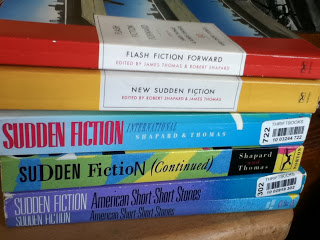You have no items in your cart. Want to get some nice things?
Go shopping
Tania Hershman, Litro’s guide to the world of flash fiction, kicks off her new column with a homage to the series of books that ignited her love of very short stories.
In my first Litro flash fiction blog, I thought I’d begin where it began for me. And since my blog posts are lengthy, whereas flash fiction is not, I will stick to 500 words, hoping hope that, as with the best flash, there will be much in a small space! I’d like to cover all aspects, from reading and writing it to where to find it, and anything else you’d like me to address.
My introduction to the shortest short fiction came in the late 1990s, through the Sudden Fiction series of books.
The first was Sudden Fiction: American Short Short Stories, edited by Robert Shapard and James Thomas (Gibbs Smith publishers), and the fact that it was published in 1986, (yes, pre-internet!) undermines the popular notion that flash is a new form developed for small-screen reading.
What is Sudden Fiction? Here it means stories of between one to five pages. The working title had been Blasters, but, say Robert and James in their introduction, this didn’t go down well. Then someone suggested Sudden. “Without warning, from the Latin subire, to steal upon. Unforeseen, swift. Sudden. Yes.” And here’s a beautiful description I think few could better:
“Highly compressed, highly charged, insidious, protean, sudden, alarming, tantalizing, these short-shorts confer form on small corners of chaos, can do in a page what a novel does in two hundred. If they can stop time and make it timeless, they are here for you, above all, as living voices.”
Imagine how excited I was to come across this book, as someone new to short fiction. I was trained as a journalist to prize brevity, to say as much as possible in a few words, and here was the fictional equivalent! Really, could this be a story? I opened the book skeptically. This is what I found: 70 short short stories, by everyone from Grace Paley, John Cheever, Donald Barthelme, John Updike, Barry Hannah, Charles Baxter, Raymond Carver and Tobias Wolff to Ray Bradbury, Joyce Carol Oates, Ernest Hemingway, Lydia Davis, and Bernard Malamud. Plus many writers new to me.
The first story, Mother, by Grace Paley, nearly slammed me against the wall. It begins:
“One day I was listening to the AM radio. I heard a song: ‘Oh I Long to See My Mother in the Doorway’. By God! I said. I understand that song. I have often longed to see my mother in the doorway. As a matter of fact, she did stand frequently in various doorways, looking at me.”
In one page, this exquisite piece covers the whole of life and death as only Paley can. 15 years later and I have never forgotten this story. Many of the others had the same effect and I return to them again and again. So, I invite you to taste Sudden Fiction – and its follow-up volumes, from Sudden Fictional International to the shorter Flash Fiction Forward. They cover so many styles, forms, genres. There can be no better introduction to the tiniest of fictions.
Listen to our podcast about Flash Fiction featuring stories from Tania, plus David Gaffney, Vanessa Gebbie and Calum Kerr.
Tania was our interviewee on the Litro Q&A last year, read her interview here.
And for a weekly dose of flash, check out our #FridayFlash slot.

About Tania Hershman
Tania Hershman is the author of two story collections: My Mother Was An Upright Piano: Fictions (Tangent Books, 2012), a collection of 56 very short fictions, and The White Road and Other Stories (Salt, 2008; commended, 2009 Orange Award for New Writers) . Tania's short stories and poetry are published or forthcoming in, among others, Five Dials, Stinging Fly, Tears in the Fence, PANK magazine, Smokelong Quarterly, the London Magazine, and New Scientist, and on BBC Radio. She is writer-in-residence in Bristol University's Science Faculty and editor of The Short Review, the online journal spotlighting short story collections and their authors. Tania teaches regularly for the Arvon Foundation and gives workshops on short stories, flash fiction and science-inspired fiction. Check out her website here.




Yay, Tania Hershman in the house! Great post, Tania. I look forward to more.
In the beginning: Sudden Fiction with @TaniaHershman | Litro https://t.co/CJZH8jMUSJ
Good post. Thanks Tania…
Sudden Fiction (Continued) was my introduction to flash fiction. I purchased it from a new chain called Barnes & Noble while visiting my agent in Denver in 1996. I quickly became addicted to the quick and powerful method of storytelling. Still to this day one of my favorite books.